Look, I’ve been obsessed with adventure books for years, and I’m excited to share the ones that kept me up way too late turning pages. You know that feeling when you’re supposed to be asleep but you just need to see what happens next? That’s what these 25 stories deliver every single time.
I’ve organized these into six different types because honestly, what gets your heart racing might put me to sleep, and that’s totally okay. I’ll break down what makes each story addictive and help you figure out which ones will hit just right for you. We’re talking classic adventures that started it all, modern survival tales that’ll make you question your camping plans, fantasy epics that transport you completely, historical adventures that make the past come alive, contemporary thrillers that feel ripped from headlines, and sci-fi journeys that’ll blow your mind.
Here’s How to Pick Your Next Book Obsession
Adventure books aren’t one-size-fits-all, and thank goodness for that. What works depends entirely on your mood, your schedule, and honestly, what kind of emotional chaos you’re ready to handle.
Figuring out what you’re actually in the mood for will save you from starting three different books and finishing none of them (we’ve all been there). Let’s talk about the stuff that actually matters when you’re standing in a bookstore or scrolling through your library app at midnight.
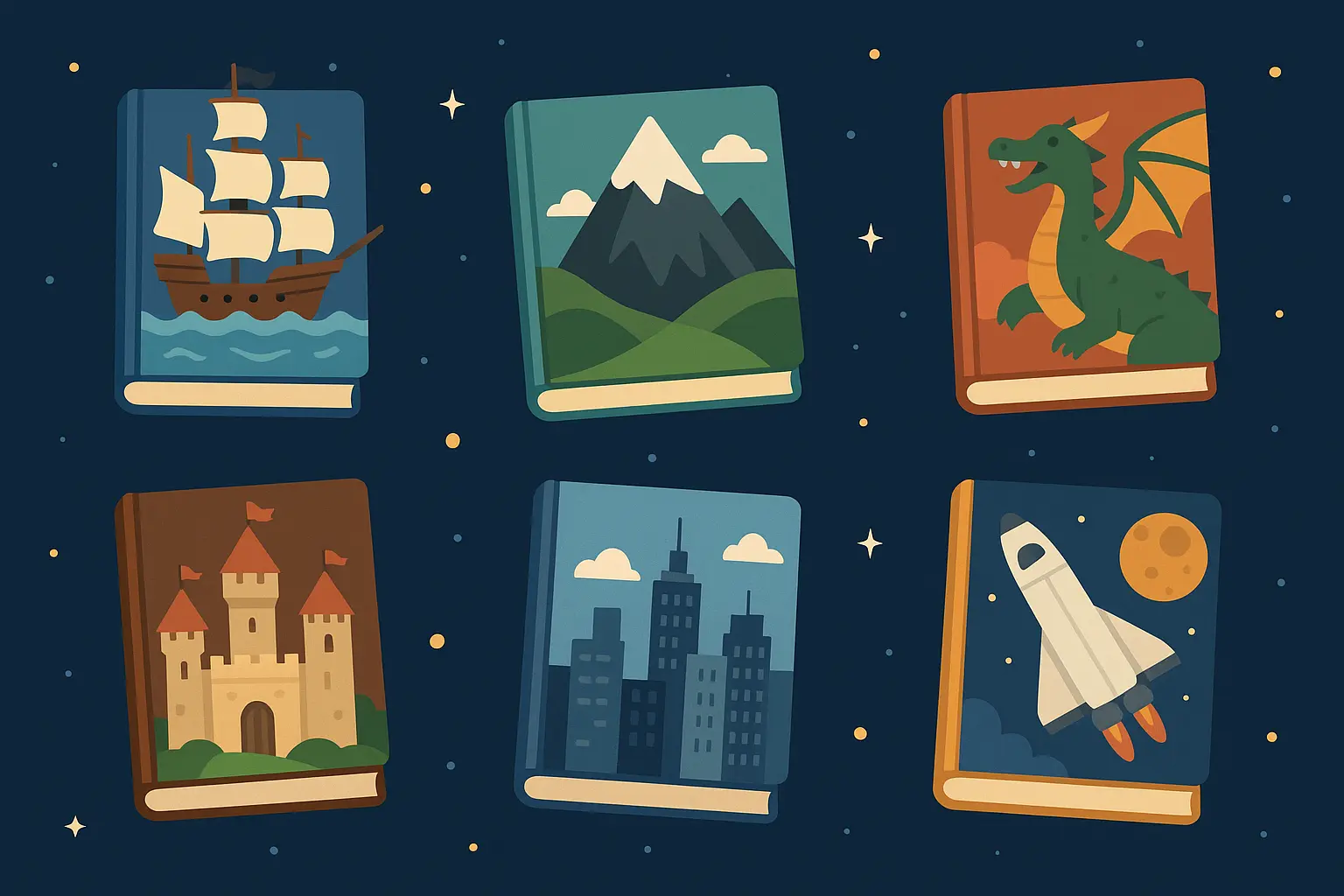
What Kind of World Do You Want to Escape To? This is huge. Some days you want to sail with pirates in the Caribbean, other days you need to be on Mars solving impossible problems. Historical stuff like naval battles during the Napoleonic Wars hits different than urban adventures in modern-day Bangkok. And honestly? Sometimes you just want dragons and magic because the real world is exhausting.
Understanding what makes stories tick can help you appreciate why certain story examples just work better than others, no matter what genre you’re reading.
How Much Action Can You Handle? I’m talking about pacing here. Some books are like being strapped to a roller coaster—non-stop action from page one. Others build slowly, letting you get to know characters before throwing them into danger. Neither is better, but knowing what you’re in the mood for matters. If you’re reading during your lunch break, you probably want something that grabs you immediately. If you’re settling in for a weekend binge, slow builds can be incredibly satisfying.
Do You Want Simple Heroes or Complicated Humans? This one’s personal. Sometimes you want a clear good guy who always does the right thing—it’s comforting. Other times you want messy, flawed characters who make questionable decisions because that feels more real. Both have their place, but it’s good to know what you’re getting into.
How Much Fantasy Can You Handle? Be honest with yourself here. If you rolled your eyes at Harry Potter, maybe skip the books with complex magic systems. But if you secretly loved those movies, you might be ready for more than you think. Some books ease you into fantasy elements, while others drop you into completely alien worlds from chapter one.
What Are You Looking to Feel? This might be the most important question. Are you looking for pure escapism to forget about your day? Do you want something that’ll make you think about life differently? Sometimes you want to ugly-cry on a plane (looking at you, Wild), and sometimes you just want to laugh at ridiculous situations in space.
How Much Time Do You Actually Have? Let’s be real about this. Some books are quick, intense experiences you can knock out in a weekend. Others are massive commitments that’ll live on your nightstand for months. Don’t feel guilty about choosing based on your actual life, not your ideal reading life.
|
What You’re In The Mood For |
Quick Questions to Ask Yourself |
Books That Deliver |
|---|---|---|
|
Setting Preference |
Pirates or spaceships? Past or future? |
Historical: Master and Commander; Modern: The Martian; Fantasy: The Hobbit |
|
Pacing Needs |
Need immediate action or okay with slow builds? |
Fast: The Bourne Identity; Balanced: Treasure Island; Slow Build: Dune |
|
Character Complexity |
Want clear heroes or complicated people? |
Simple: The Hobbit; Complex: The Count of Monte Cristo |
|
Fantasy Tolerance |
How weird can it get before you check out? |
High Realism: Into the Wild; Low Fantasy: The Name of the Wind; High Fantasy: The Way of Kings |
|
Emotional Goals |
Want to laugh, cry, or just escape? |
Light: Hitchhiker’s Guide; Deep: Wild |
|
Time Reality |
What can you actually commit to? |
Short: Hatchet; Medium: The Martian; Long: The Pillars of the Earth |
25 Books That’ll Ruin You for Everything Else
These books span six different flavors of adventure, and I’ve picked 25 that represent the absolute best of what each category can do. Each one delivers on that promise of keeping you up way too late, but they do it in completely different ways.
The Classics That Started It All (5 Books)
These are the books that basically invented adventure storytelling as we know it. Yeah, some of the language feels old-fashioned, but the stories? Still absolutely gripping. These are the ones that taught every adventure writer who came after them how it’s done.
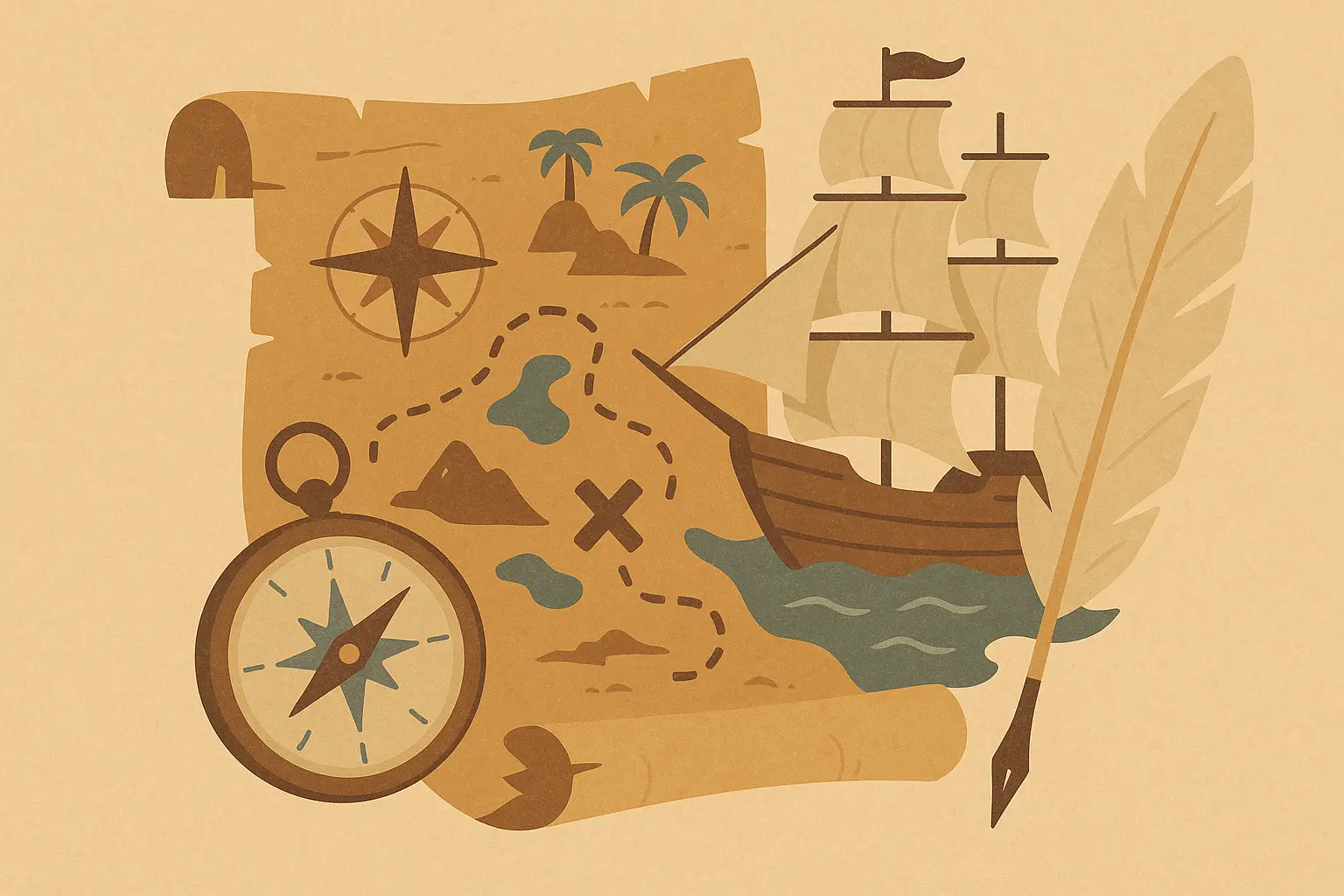
1. Treasure Island by Robert Louis Stevenson
Jim Hawkins is basically that kid from your neighborhood who’d definitely get into trouble—except his trouble involves actual pirates and buried treasure. Stevenson created the template that every adventure story still follows: ordinary kid gets thrown into extraordinary circumstances, meets morally questionable mentor figure (Long John Silver is unforgettable), faces increasingly dangerous challenges, and comes out the other side completely changed. This book invented half the pirate tropes we still love today.
2. The Count of Monte Cristo by Alexandre Dumas
Fair warning: this book is LONG. Like, seriously long. Clear your schedule. But Edmond Dantès’s transformation from innocent sailor to sophisticated revenge mastermind is absolutely worth every page. This is psychological thriller meets swashbuckling adventure, and Dumas makes you root for someone doing objectively terrible things. The plotting is so intricate it feels like watching a master chess player work—every move connects to something that happened 200 pages ago.
3. Robinson Crusoe by Daniel Defoe
This is the book that invented the survival story. Crusoe gets shipwrecked and has to figure out how to stay alive on a deserted island with basically nothing. It sounds simple, but Defoe makes every small victory feel huge. Learning to make fire, growing crops, building shelter—you’ll find yourself mentally taking notes like you might need this information someday.
4. The Three Musketeers by Alexandre Dumas
“All for one and one for all” became a thing because of this book. D’Artagnan and his friends sword-fight their way through political conspiracies in 17th-century France, and it’s exactly as fun as it sounds. The friendship between the four main characters is what makes this work—they genuinely care about each other, which makes you care about what happens to them.
5. Around the World in Eighty Days by Jules Verne
Phileas Fogg bets he can travel around the world in 80 days, which was basically impossible in 1873. What follows is a methodical adventure where everything that can go wrong does go wrong, but Fogg’s unflappable determination keeps pushing forward. It’s like watching someone play a really difficult video game with infinite patience and clever problem-solving.
Why Treasure Island Still Works: Stevenson figured out something that every adventure writer since has tried to copy: Jim Hawkins starts as someone you could actually know, then gets thrown into situations that are completely over his head. But instead of being rescued by adults, he has to figure it out himself. That combination of relatability and impossible circumstances is why this book spawned everything from Star Wars to Harry Potter.
Books Where People Almost Die in Nature (4 Books)
Modern survival stories are terrifying because they feel completely possible. These aren’t fantasy adventures—they’re “this could actually happen to me” adventures, which makes them hit different. They’re all about human ingenuity, determination, and what happens when everything goes wrong at the worst possible time.
6. Into the Wild by Jon Krakauer
Fair warning: this book will mess you up emotionally. Don’t read it if you’re already feeling down. Chris McCandless decides to live off the land in Alaska, and Krakauer investigates what went wrong. It’s part adventure story, part cautionary tale, and completely gripping. You’ll spend the whole book wanting to reach through the pages and make different choices for him.
7. The Martian by Andy Weir
Mark Watney gets stranded on Mars and has to science his way out of dying. This should be depressing and terrifying, but Watney’s humor and problem-solving mindset make it oddly uplifting. Weir makes all the technical stuff accessible without dumbing it down, and you’ll find yourself actually understanding how to grow potatoes in Martian soil (probably not useful, but fascinating).
8. Hatchet by Gary Paulsen
Thirteen-year-old Brian survives a plane crash in the Canadian wilderness with nothing but a hatchet. This is young adult fiction, but don’t let that fool you—it’s intense. Paulsen doesn’t sugarcoat anything about wilderness survival, and Brian’s gradual transformation from city kid to capable survivor feels completely earned. Perfect if you want adventure without a huge time commitment.
For writers looking to craft their own survival stories, checking out various short story examples can show how tension and character development work in tight, focused scenarios.
9. Wild by Cheryl Strayed
Strayed hikes the Pacific Crest Trail alone to deal with her mother’s death and her own life falling apart. This is adventure as therapy, and it’s brutally honest about both the physical challenges of long-distance hiking and the emotional work of healing. I ugly-cried at the end of this one on a plane. The passenger next to me was concerned.
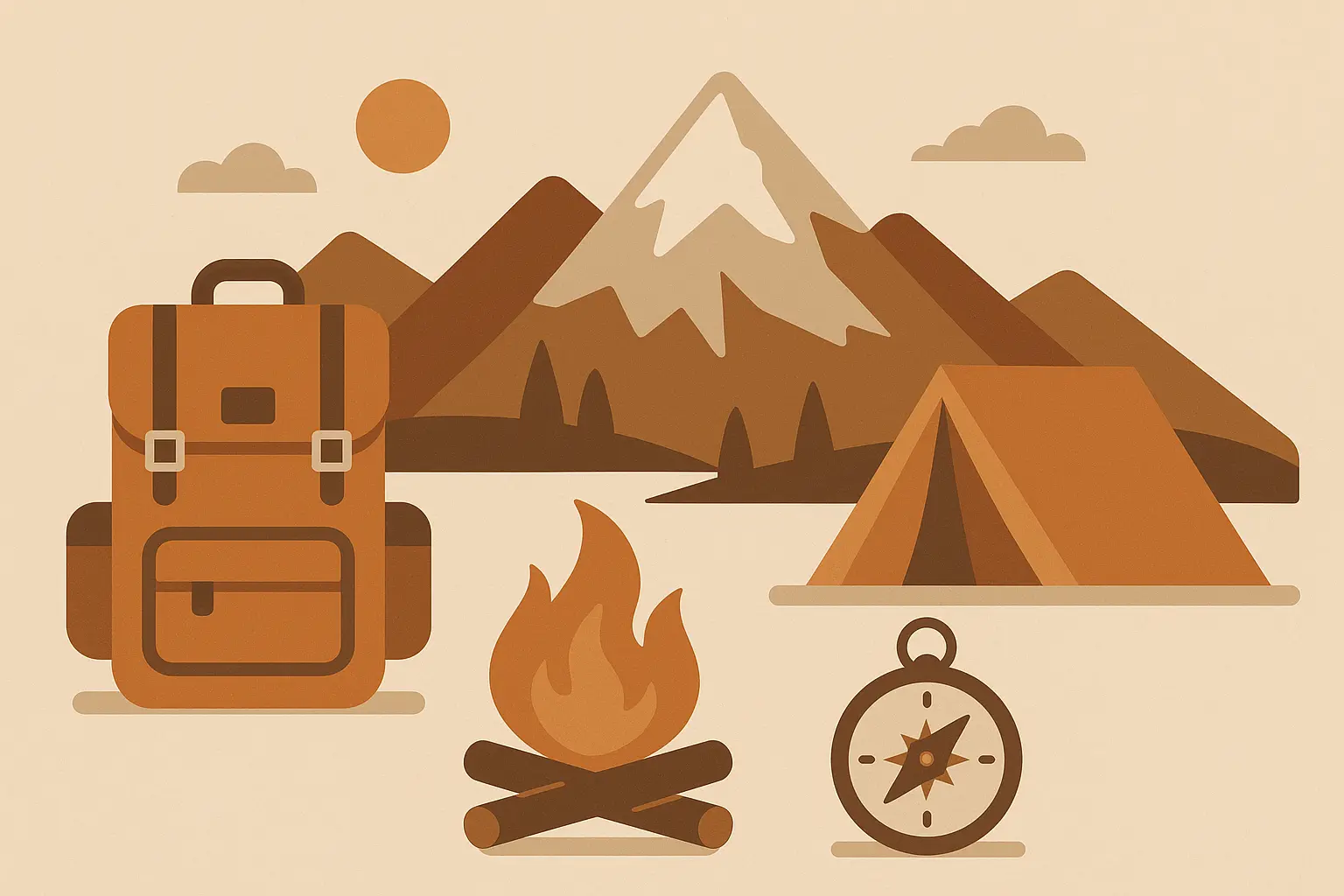
Fantasy Books That Transport You Completely (4 Books)
Here’s the deal with fantasy: if you’re skeptical about magic and dragons, start with The Hobbit. If you’re already a believer, jump straight to The Way of Kings. These books prove that fantastical settings can tackle real human problems while providing complete escape from reality.
10. The Hobbit by J.R.R. Tolkien
Bilbo Baggins gets dragged out of his comfortable hobbit-hole to help dwarves reclaim their homeland from a dragon. This is fantasy adventure at its most accessible—the magic feels natural, the characters are memorable, and Bilbo’s transformation from homebody to unlikely hero is genuinely moving. If you’ve only seen the movies, the book is much tighter and more focused.
11. The Name of the Wind by Patrick Rothfuss
Kvothe tells the story of his legendary adventures, and Rothfuss makes the storytelling itself part of the adventure. This is fantasy for people who love beautiful writing and complex world-building. Fair warning: the third book in the series has been “coming soon” for over a decade, but the first two are so good they’re worth reading anyway.
12. The Way of Kings by Brandon Sanderson
This is epic fantasy done right. Multiple characters, innovative magic systems, massive world-building, and a plot that builds to genuinely surprising revelations. Sanderson is incredibly good at making you care about characters before putting them through hell. Yes, it’s long, but it earns every page.
13. The Lies of Locke Lamora by Scott Lynch
Fantasy Ocean’s Eleven. Locke and his crew are gentleman thieves pulling elaborate cons in a fantasy version of Venice. Lynch combines heist elements with traditional fantasy adventure, proving that fantasy doesn’t always need swords and sorcery—sometimes wit and friendship are enough.
Historical Adventures That Make the Past Come Alive (4 Books)
These books do something magical: they make you feel like you’re actually living in different time periods. The authors did their homework, and it shows. You’ll learn history without realizing you’re learning history because you’re too busy being entertained.
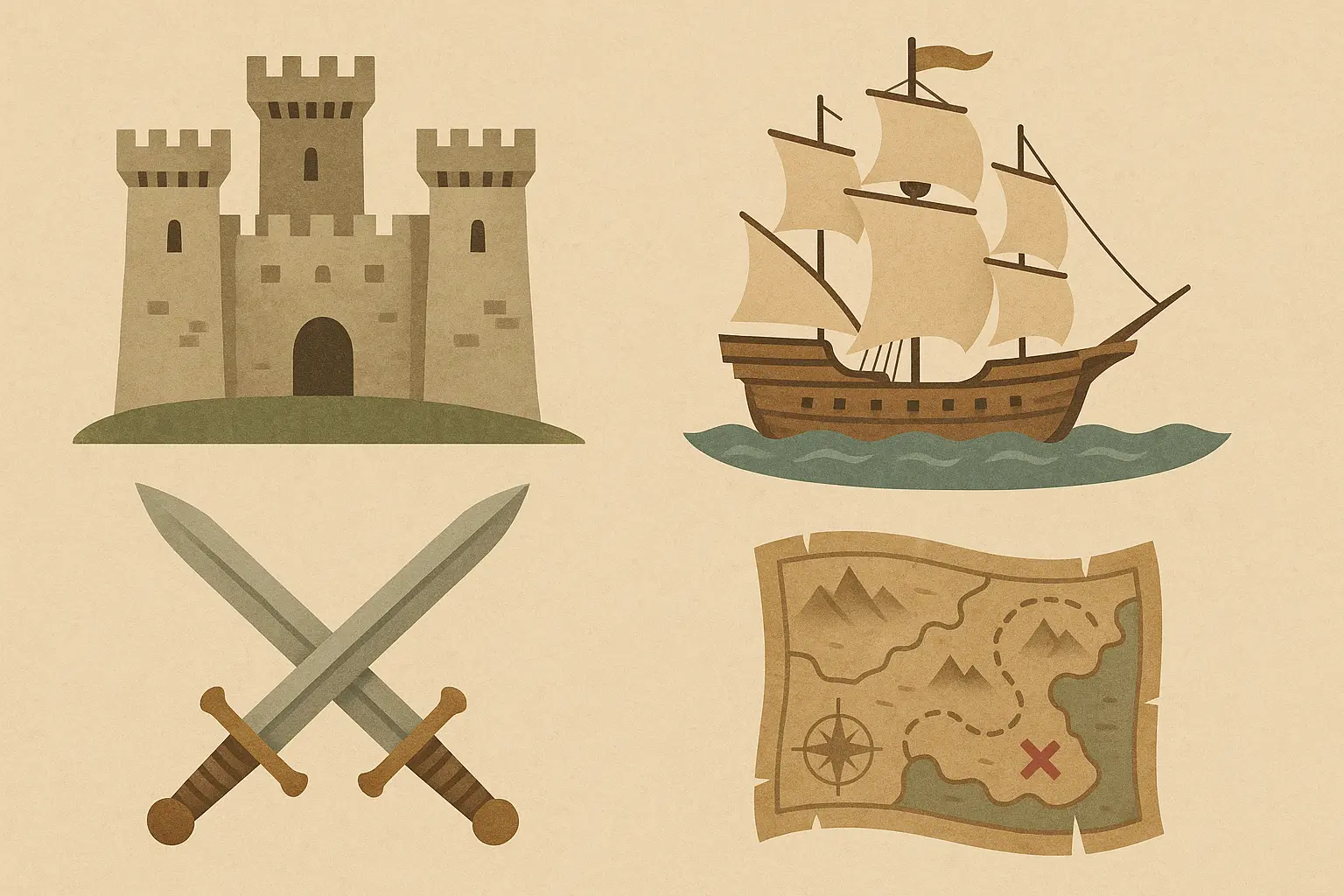
14. Master and Commander by Patrick O’Brian
Captain Jack Aubrey and Dr. Stephen Maturin’s friendship drives these naval adventures during the Napoleonic Wars. O’Brian’s research is so thorough that you’ll understand 18th-century naval warfare better than most history majors. Don’t feel guilty about the audiobook version—those naval terms are rough. The friendship between the two main characters is what makes this series special.
15. The Pillars of the Earth by Ken Follett
Medieval England comes alive through the building of a cathedral. This sounds boring but absolutely isn’t. Follett follows multiple families across decades, showing how ordinary people lived through extraordinary times. It’s like a medieval soap opera, but with better writing and more historical accuracy.
16. Shogun by James Clavell
An English sailor gets shipwrecked in feudal Japan and has to navigate a completely foreign culture to survive. Clavell makes you feel the culture shock alongside the protagonist, and the political intrigue is fascinating. This book will teach you more about Japanese culture than most documentaries.
17. The Last Kingdom by Bernard Cornwell
Uhtred grows up caught between Saxon and Viking cultures during England’s formation. Cornwell knows medieval warfare inside and out, and his battle scenes are incredibly vivid without being gratuitously violent. The internal conflict of divided loyalty makes this more than just historical action.
Why Master and Commander Works So Well: O’Brian never sacrifices historical accuracy for drama, but he also never lets the research overwhelm the story. When Aubrey’s ship engages in battle, every detail from wind direction to cannon procedures is historically accurate, which makes the danger feel real. But the heart of the series is the friendship between two very different men who genuinely like each other, and that relationship keeps you invested through all the naval terminology.
Contemporary Thrillers That Feel Ripped From Headlines (4 Books)
These adventures happen in our world, with our technology, in places you could actually visit. That familiarity makes the extraordinary circumstances feel that much more intense because part of your brain keeps thinking “this could happen.”
18. The Bourne Identity by Robert Ludlum
Jason Bourne wakes up with amnesia and discovers he might be an assassin. The identity mystery drives everything, and Ludlum keeps the action moving while slowly revealing who Bourne really is. This spawned countless imitators, but the original is still the best because it grounds all the action in Bourne’s desperate need to understand himself.
19. Jurassic Park by Michael Crichton
Scientists bring dinosaurs back to life, and everything goes wrong in the most spectacular way possible. Crichton makes the science feel plausible enough to be terrifying. The book is much more intense than the movie, with more characters meeting gruesome ends and more detailed explanations of why this was such a terrible idea.
20. The Beach by Alex Garland
Backpackers discover a secret paradise in Thailand that turns into a nightmare. This is travel adventure meets psychological horror, and it perfectly captures both the appeal and the danger of trying to escape from reality. Garland understands backpacker culture well enough to make the setup feel authentic before everything goes sideways.
21. Into Thin Air by Jon Krakauer
Krakauer was on Mount Everest when everything went wrong during a commercial expedition. This non-fiction adventure reads like a thriller, but everything actually happened. The book raises uncomfortable questions about the commercialization of extreme adventure while delivering an incredibly intense survival story.

Sci-Fi Adventures That’ll Blow Your Mind (4 Books)
Science fiction adventure uses future settings and speculative technology to explore timeless human questions. These books prove that spaceships and alien worlds can make stories more human, not less.
22. Dune by Frank Herbert
Paul Atreides navigates desert planet politics while developing mysterious powers. This is space opera at its most complex, with ecological themes, political intrigue, and mystical elements all woven together. I’ll be honest—I tried Dune three times before it clicked. Don’t feel bad if it doesn’t grab you immediately. Once it does, though, you’ll understand why people are still obsessed with it 50+ years later.
23. The Hitchhiker’s Guide to the Galaxy by Douglas Adams
Arthur Dent’s accidental journey through space after Earth gets demolished is pure comedic genius. Adams uses absurdist humor to explore big philosophical questions about existence, meaning, and why we’re all here. It’s adventure story meets existential comedy, and somehow it works perfectly. Reddit will tell you this book is perfect, and honestly? They’re not wrong this time.
24. Old Man’s War by John Scalzi
John Perry joins the military at age 75 to fight aliens among the stars. Scalzi makes military sci-fi accessible while exploring what it means to be human when technology can change everything about your body. The book tackles aging, identity, and second chances through space adventure, and it’s surprisingly moving.
25. The Left Hand of Darkness by Ursula K. Le Guin
A human diplomat tries to convince an alien world to join a galactic alliance, but the real adventure is cultural. Le Guin uses the alien perspective to examine human assumptions about gender, politics, and society. This is thoughtful sci-fi that happens to have adventure elements, perfect for readers who want their entertainment to make them think.

What Makes These Books Actually Work
Let me break down why these 25 stories keep people up at night turning pages, because understanding what works can help you pick your next obsession.
The Classics Still Hit Different
Classic adventures work because they figured out the formula that everyone else is still copying. They balance character growth with exciting plot developments, and they don’t rush either one.
Treasure Island gives you time to care about Jim Hawkins before throwing him into danger, then makes every challenge feel earned. The Count of Monte Cristo builds Dantès’s transformation slowly, so when he finally gets his revenge, it feels satisfying instead of cruel. These books understand that adventure without character development is just a series of action scenes, but character development without adventure is just a therapy session.
Robinson Crusoe basically invented the survival genre by focusing on practical problem-solving alongside personal growth. Every small victory—making fire, building shelter, growing food—feels huge because Defoe makes you understand how difficult it actually is.
Modern Survival Stories Feel Possible
What makes contemporary survival adventures so gripping is that they could happen to you. Into the Wild is terrifying because Chris McCandless was a real person who made decisions that seemed reasonable at the time. The Martian works because Weir grounds every problem in actual science—you believe Watney can solve these challenges because the solutions are logical.
Hatchet succeeds with young readers because Brian’s survival skills develop gradually and realistically. He doesn’t suddenly become an expert woodsman; he makes mistakes, learns from them, and slowly gets better. That progression feels authentic.
Wild combines physical adventure with emotional healing, showing how external challenges can drive internal growth. Strayed’s honest about both the trail difficulties and her personal struggles, which makes the adventure feel like genuine transformation rather than just a hiking story.
Fantasy Adventures Transport You Completely
Good fantasy adventures establish clear rules for their worlds and stick to them. The Hobbit introduces magical elements gradually—first talking animals, then elves, then dragons—so you adjust naturally to each new impossibility.
The Name of the Wind succeeds because Rothfuss makes magic feel like science with rules and limitations. Kvothe’s abilities have costs and consequences, which keeps the story grounded even in fantastical situations.
The Way of Kings proves that epic fantasy can handle multiple complex storylines without losing focus. Sanderson gives each character distinct challenges and growth arcs, then weaves them together for maximum impact.
Historical Adventures Make the Past Feel Real
The best historical adventures succeed through research that enhances rather than overwhelms the story. Master and Commander gets every naval detail right, but O’Brian never lets the research slow down the friendship between Aubrey and Maturin.
Shogun works because Clavell makes you feel the culture shock alongside Blackthorne. You learn about feudal Japan naturally through the protagonist’s confusion and gradual understanding.
The Pillars of the Earth brings medieval life to vivid reality through ordinary people facing extraordinary circumstances. Follett’s characters feel like real humans dealing with universal problems—love, ambition, survival—within their specific historical context.
|
Story Type |
What Makes Them Work |
What to Expect |
Perfect For |
|---|---|---|---|
|
Classics |
Timeless character arcs, proven story structures |
Slower pacing, richer language, foundational themes |
Readers who appreciate literary history |
|
Survival |
Realistic challenges, problem-solving focus |
Steady tension, practical details, personal growth |
People who like logical solutions |
|
Fantasy |
Consistent world-building, universal themes |
Variable pacing, imaginative settings, escapism |
Readers wanting complete transportation |
|
Historical |
Authentic period details, human universals |
Immersive research, cultural education |
History buffs and detail lovers |
|
Thrillers |
Contemporary relevance, high stakes |
Fast pacing, familiar settings, immediate tension |
Readers wanting current-day excitement |
|
Sci-Fi |
Speculative elements, philosophical depth |
Innovative concepts, future possibilities |
People who like “what if” scenarios |
Contemporary Thrillers Feel Immediate
Modern thrillers work because they use familiar settings to create extraordinary circumstances. The Bourne Identity drops spy thriller elements into recognizable European cities. Jurassic Park takes cutting-edge science and shows how it could go catastrophically wrong.
The Beach succeeds because it understands backpacker culture well enough to make the setup believable before everything goes wrong. Into Thin Air is terrifying because it’s completely true—these events actually happened to real people.
Sci-Fi Adventures Ask Big Questions
The best science fiction adventures use futuristic settings to explore current human concerns. Dune examines environmental destruction, political power, and religious manipulation through space opera adventure. The Left Hand of Darkness uses alien culture to question human assumptions about gender and society.
Old Man’s War tackles aging and identity through military sci-fi adventure. Hitchhiker’s Guide uses cosmic absurdity to explore existential questions about meaning and purpose.

Matching Your Mood to Your Next Book Obsession
Here’s how to actually pick something you’ll love instead of something you think you should read.
When You Need Pure Escapism
Some days the real world is exhausting and you just want to disappear into someone else’s problems. The Hobbit offers gentle fantasy adventure without complex moral ambiguity. Treasure Island provides classic adventure with clear heroes and villains. The Three Musketeers delivers swashbuckling fun with loyal friendships.
If you’re thinking “I should read classics,” start with Treasure Island, not Moby Dick. Trust me on this.
When You Want to Feel Capable
Sometimes you need stories about people solving problems through intelligence and determination. The Martian shows how knowledge and humor can overcome impossible odds. Hatchet demonstrates that ordinary people can develop extraordinary survival skills. Master and Commander celebrates competence and friendship in dangerous situations.
When You Need Emotional Catharsis
If you’re ready to feel things deeply, Wild combines physical adventure with emotional healing. The Count of Monte Cristo explores justice and revenge through elaborate plotting. Into the Wild examines idealism and its consequences through tragic adventure.
When You Want Your Mind Blown
For readers seeking innovative storytelling and world-building, Dune creates complex political and ecological systems. The Name of the Wind demonstrates how narrative structure can enhance adventure. The Way of Kings shows how multiple storylines can build to incredible climaxes.
When You Have Limited Time
If you’re reading during lunch breaks or commutes, Hatchet has short, punchy chapters perfect for interrupted reading. The Martian maintains momentum through technical problem-solving. The Hitchhiker’s Guide delivers quick laughs and philosophical insights.
Don’t feel guilty about audiobooks for Master and Commander—those naval terms are rough. And if you’re the type who reads on your commute, skip The Pillars of the Earth—it’s amazing but needs your full attention.
When You Want to Learn Something
Historical adventures teach you about different time periods without feeling like homework. Shogun immerses you in feudal Japanese culture. The Pillars of the Earth shows how medieval people actually lived. Master and Commander explains 18th-century naval warfare better than most documentaries.
Real Talk About Reading Preferences
Every book club I’ve been in splits into Team Dantès vs Team “This Is Too Long” when we try The Count of Monte Cristo. Some people love Into Thin Air while others find it too depressing. Dune has passionate fans and people who bounced off it completely.
This is normal and okay. Your reading preferences are valid whether you love literary classics or prefer modern thrillers. The goal is finding books that genuinely excite you, not books that make you feel smart or cultured.
For aspiring writers inspired by these adventures, understanding story theme examples can help you see how universal themes work across different genres and settings.
|
Your Current Situation |
What You Probably Want |
Books That Deliver |
Skip If You’re |
|---|---|---|---|
|
Stressed at work |
Escapism and problem-solving |
The Martian, The Hobbit, Hatchet |
Burned out (avoid Into the Wild) |
|
Feeling stuck in life |
Characters who transform |
Wild, The Count of Monte Cristo, The Name of the Wind |
Impatient (these build slowly) |
|
Want pure entertainment |
Action and clear heroes |
The Three Musketeers, The Bourne Identity, Jurassic Park |
Looking for deep meaning |
|
Curious about history |
Immersive period details |
Master and Commander, Shogun, The Pillars of the Earth |
Wanting quick reads |
|
Need intellectual stimulation |
Complex themes and world-building |
Dune, The Left Hand of Darkness, Old Man’s War |
Wanting light entertainment |
|
Short on time |
Quick, engaging stories |
Hatchet, The Martian, The Hobbit |
Wanting epic scope |
Finding Your Next Adventure (With a Little Help)
Sometimes I get stuck wanting to write my own adventure story after reading these amazing books. There’s this cool AI tool called Nairrate’s Story Prompt Generator that helps with story ideas—way better than staring at a blank page wondering where to start.
The thing about great adventure stories is they all start with compelling “what if” scenarios. What if you were stranded on Mars? What if you found a treasure map? What if you woke up with amnesia and discovered you might be an assassin? These prompts become the foundation for everything that follows.

For writers looking to understand how compelling narratives actually work, exploring how to write a story using brain science principles can provide insights into crafting adventures that genuinely resonate with readers.
The AI understands what makes adventure stories work across all these different genres—survival challenges, heroic quests, cultural exploration, technological speculation. It generates starting points that honor storytelling traditions while sparking unique directions you might never have considered.
These 25 books prove that great adventures transcend their settings and time periods. They speak to universal human desires for growth, challenge, and meaningful experience. Whether you’re reading about 18th-century naval battles or future space colonization, the core appeal remains the same: watching characters face impossible odds and discover what they’re truly capable of.
The Nairrate tool taps into that same creative energy, helping generate story ideas that could join this tradition of compelling adventure literature. It’s like having a brainstorming partner who’s read everything and can suggest connections you might miss.
Ready to find your next book obsession? Pick one of these 25 based on your current mood and available time. And if you get inspired to create your own adventure stories, try Nairrate’s Story Prompt Generator to spark that creative process.
The Bottom Line
Look, life’s too short for boring books. These 25 adventures represent the best of what the genre can offer, from classic tales that established the template to modern stories that push boundaries in exciting directions.
Don’t feel pressured to read them in any particular order or to love every single one. I’ve bought The Name of the Wind for at least five friends—yes, I’m that person—but I know it’s not for everyone. Some people bounce off fantasy completely, and that’s fine. Others can’t get enough of survival stories, while some prefer the psychological complexity of revenge narratives.
The key is being honest about what you actually enjoy rather than what you think you should enjoy. If you love non-stop action, don’t force yourself through slow-building literary adventures just because they’re “important.” If you prefer character development over explosions, don’t feel guilty about skipping the high-octane thrillers.
Your adventure reading journey should match your interests, schedule, and emotional needs. Some days call for pure escapism that lets you forget about deadlines and responsibilities. Other days you want stories that challenge your thinking or teach you something new about different cultures or time periods.
The beautiful thing about adventure literature is its incredible diversity. You can sail with pirates, survive on Mars, explore magical kingdoms, experience historical battles, solve contemporary mysteries, or travel to distant galaxies. Each story offers a different kind of escape and a different perspective on what humans can accomplish when pushed beyond their comfort zones.
Remember that the best adventure story is the one that speaks to you right now, in your current circumstances. Trust your instincts, try new genres occasionally, and don’t worry about finishing every book you start. Sometimes you’re not ready for a particular story, and that’s okay—it’ll be there when you are.
Give any of these books 50 pages. If it’s not working for you, try another. The right adventure story is out there waiting to completely wreck your sleep schedule, and honestly? That’s exactly what you want.
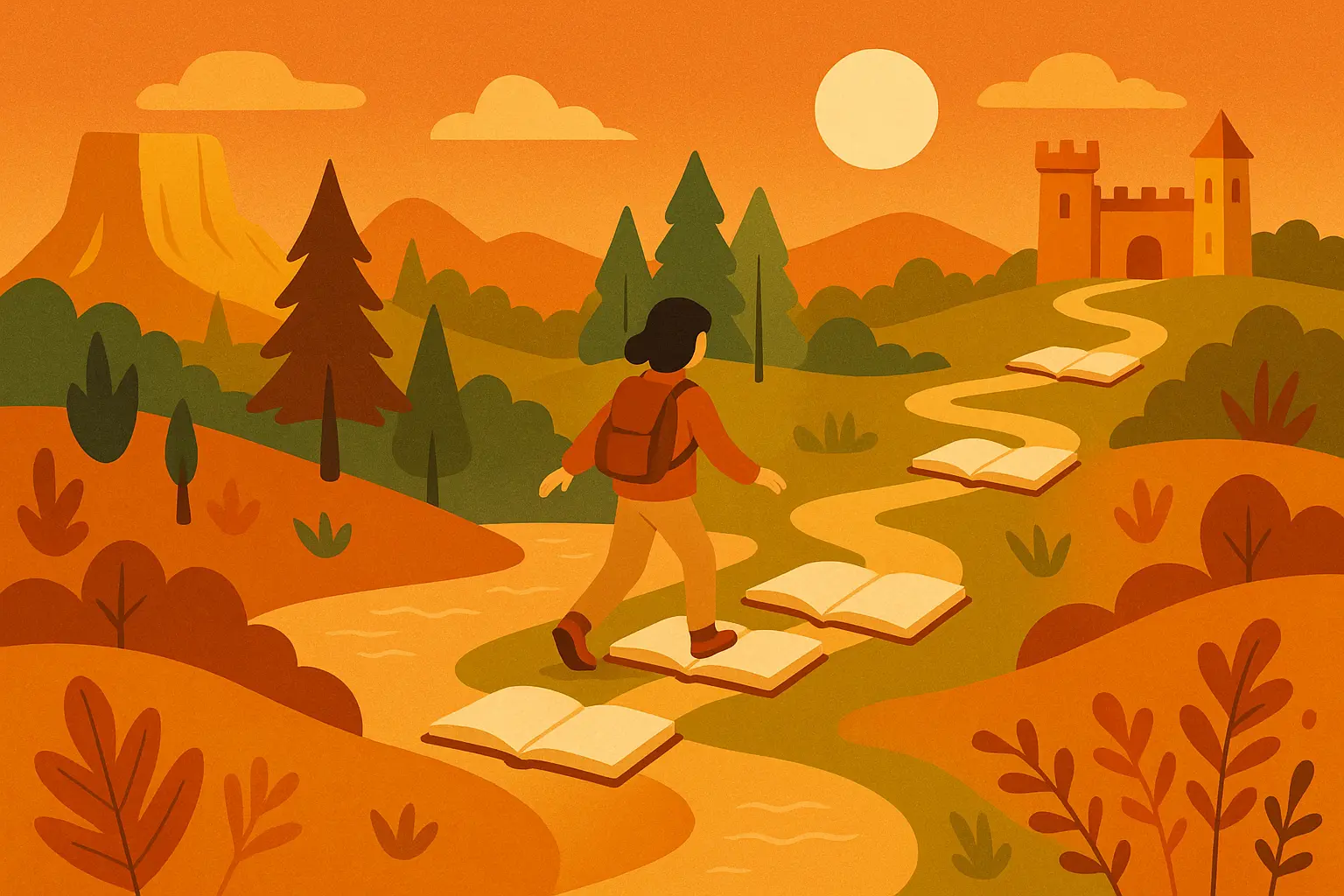

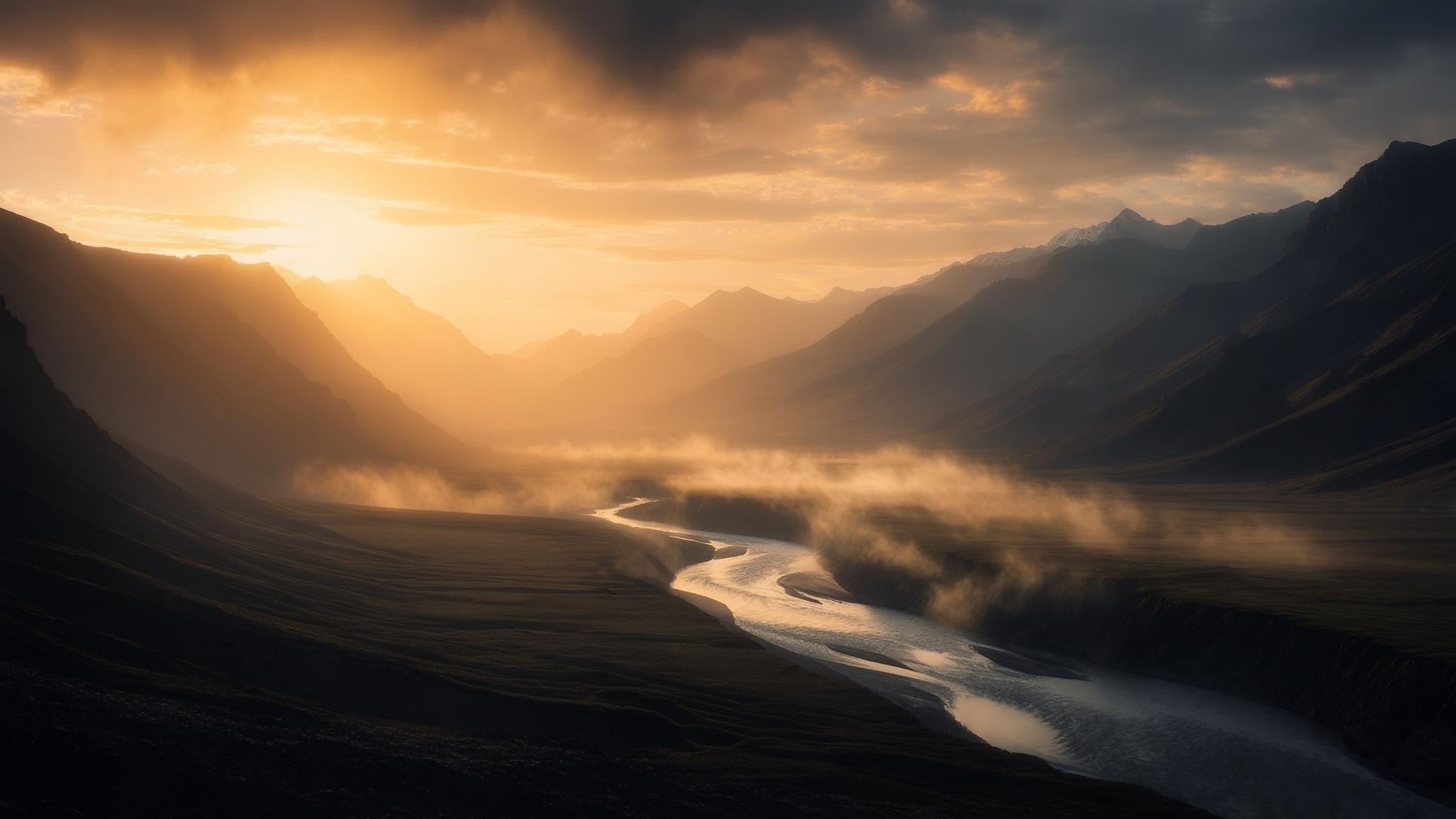

Add comment